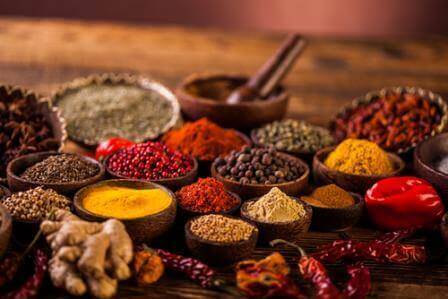Padme wrote this week to tell me about a new diet she’s been on and is very excited about. According to the creator, this eight-week meal plan will shrink your waist, melt your fat, and give you the body of your dreams.
All the recipes, which Padme reports are both delicious and filling, incorporate lots of spices like cumin, coriander, turmeric, cinnamon, cayenne, and black pepper. The idea is that all these spices speed weight loss by flushing impurities from your body and super-charging your metabolism.
After the first week, which focuses on “detox,” Padme has already lost seven pounds and is absolutely thrilled with her results. But she had some questions:
“I know I’m going to hit a plateau eventually. Are there specific combinations of spices that work better together? Are there other spices I could add that rev up my metabolism even more? Could I lose weight even faster by increasing the amount I consume? I’m willing to eat an entire jar or turmeric if it will melt away another inch.”
Does Spicy Food Speed Your Metabolism?
Increasing the amount of spice or combining them differently won’t accelerate Padme’s weight loss because the spices—as tasty and nutritious as they may be—have virtually nothing to do with the weight loss she’s experienced.
Spices do have benefits: Cinnamon has been shown to help stabilize blood sugar, for example. Other spices reduce inflammation—turmeric, garlic, and ginger are particularly potent anti-inflammatories. They are also pretty good at thinning your blood. In small amounts, that’s generally considered to be a good thing. But anyone taking blood thinning medications or with a surgical procedure coming up would want to consume these blood-thinners in moderation, if at all.
Many spices are also potent antioxidants. But as I’ve talked about before, there comes a point at which more antioxidants don’t actually do you any extra good—and that threshold is a lot lower than most people think. It’s also possible to get too many antioxidants, although this is usually a concern with supplements, not foods.
Contrary to the author’s claims, however, this spicy menu will not alkalize your body, cleanse your body of impurities, or increase your metabolic rate enough to translate into pounds—or even ounces—lost.
This diet works for one very simple reason: it is low in calories (about 1500 per day). It’s also quite low in carbohydrates (about 20% of calories), which explains the rapid initial weight loss. A sudden restriction in carbs will usually cause the body to shed quite a bit of water. This is not a sustained effect but rather a one-time adjustment. It’s also reversible: If you start eating more carbs, that water will come right back on. Either way, it’s not fat you’re losing or gaining: it’s just water.
The spice diet is moderate in protein (about 20% of calories) and relatively high in fats (60% of calories), which is probably why Padme is finding the meals tasty and satisfying.
In fact, as lower carbohydrate diets go, this one is a pretty good one. It’s got a reasonable amount of fiber, the recommended amount of fruits and vegetables, and most of the fats are from healthy sources. It’s very low in added sugar and processed foods. You could certainly do a whole lot worse!
In fact, as lower carbohydrate diets go, this one is a pretty good one.
But Padme’s suspicion is right on target: The rapid weight loss she saw in the first week will probably not continue. Aside from water weight, Padme could lose up to 2 pounds a week of actual body weight. After a few weeks, however, the rate of weight loss will gradually slow down. Why? Here's a few reasons:
Why weight loss slows with time
- As you lose weight, you need fewer calories. Unless you are continually decreasing your calorie intake, your rate of weight loss will slow.
- After several weeks of calorie restriction, your metabolism may slow down to compensate.
- With rapid and steady weight loss, it’s also hard to prevent the loss of some lean muscle tissue, which can lower your metabolic rate even more.
If you do end up reaching a plateau, you can check out the tips in episode #148: How to break a weight loss plateau.
My bigger concern is what happens when you reach your goal—or the end of the program. Padme admits that following this diet to the letter is challenging, which suggests that it may be tough to keep it up indefinitely. And this is exactly why so many people, having successfully lost a bunch of weight following a special diet, start regaining that weight the minute they finish the program. There’s just too big a gap between the way they lived and ate while on the diet and the way they live and eat in real life.
I’m hoping that Padme will be the exception that proves the rule! But for those looking for a more sustainable approach, check out episode #163: How to lose weight without dieting. And for those who still believe that the best diet is the one that takes the weight off the fastest, please check out episode #381, How to Avoid the Biggest Loser Syndrome.
I frequently get emails from listeners saying that what they’ve picked up from the Nutrition Diva podcast has helped them lose 10, 20, or even 80 pounds—not in a matter of weeks or even months but over the course of a year (or several). Getting those emails is the absolute best part of my job. It may not sound as sexy as getting the body of your dreams in 8 weeks. On the other hand, it’s a lot more rewarding than losing the same fifteen pounds every year.
Comments? Questions? Post them below or on the Nutrition Diva Facebook page.
Tidak ada komentar:
Posting Komentar